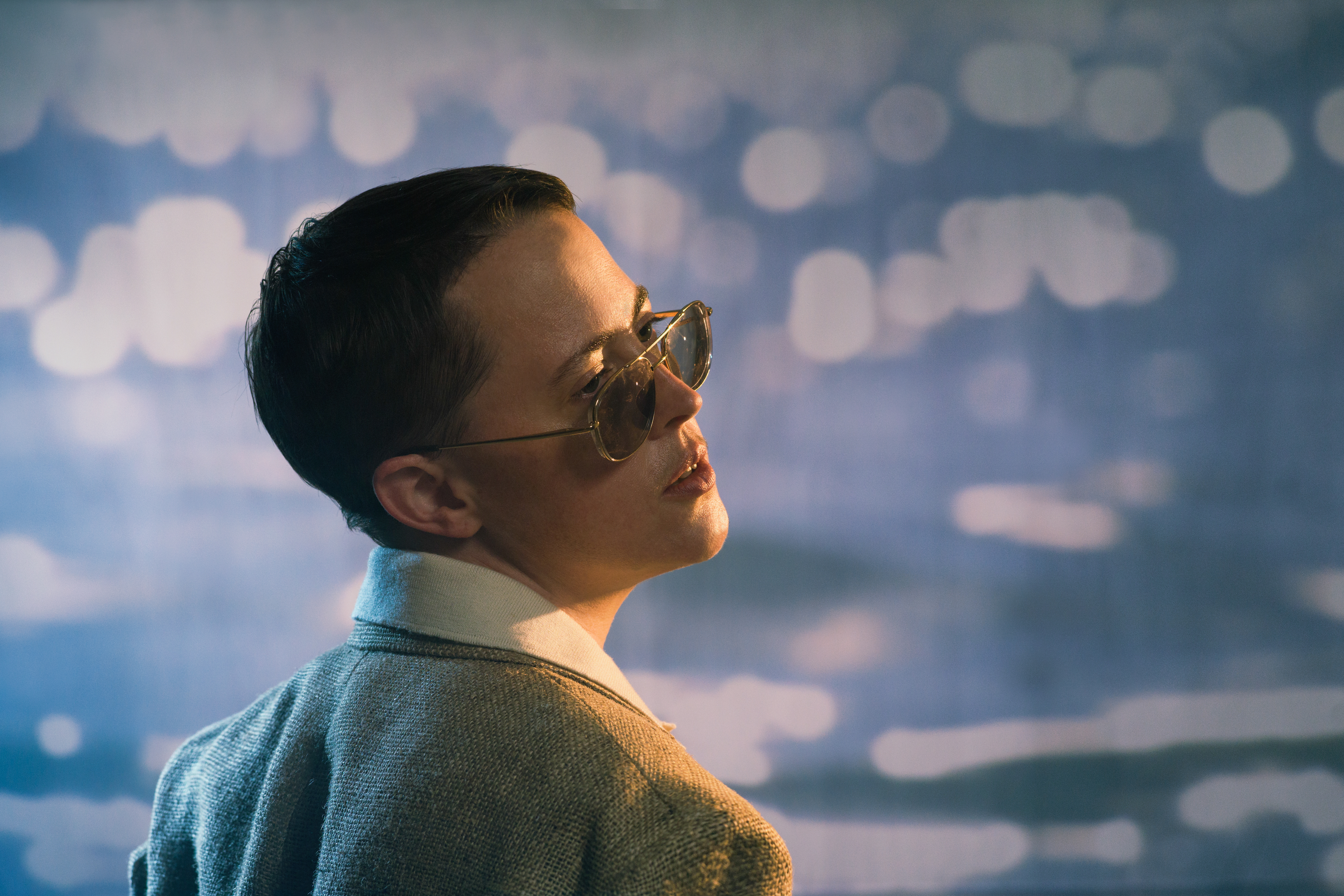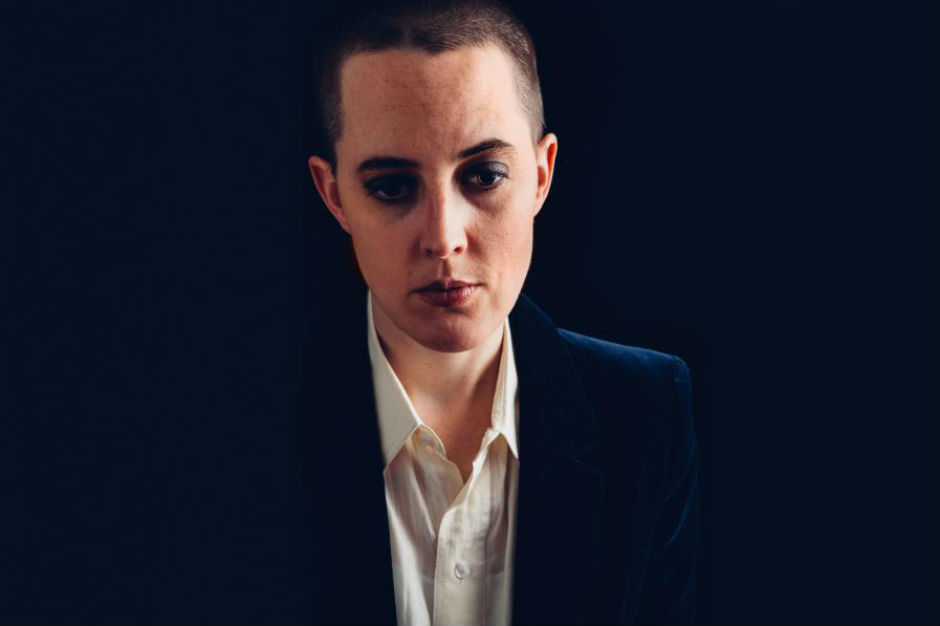With Lower Dens’ third album, Escape From Evil, the Baltimore-based outfit is pulling quite the Houdini act: Escaping the “cold and dark” place they’d found themselves trapped in as a band, bursting out with the poppiest work of their career, and with a brighter disposition that saved the quartet from disintegrating altogether. But even compared to their more brooding, emotionally distant first two LPs (2010’s Twin-Hand Movement and 2012’s Nootropics), Escape From Evil is hardly sunshine, lollipops, and rainbows: The album’s ten tracks also feature unprecedentedly direct and confessional lyrics from singer/songwriter Jana Hunter, who filtered her relationship anxiety into the Dens’ new wave-inspired productions, making Evil the group’s most accessible and intimate work to date.
SPIN talked with Hunter recently about the album’s ’80s-era inspirations, embracing lyric writing as therapy, and how Lower Dens found their way out of the darkness, becoming more than just a “winter band” in the process.
The album sounds extremely new wavy to me, especially compared to your earlier albums. Was that a conscious influence on the band while you guys were recording?
That’s music that I grew up around a lot. I have siblings that are almost a generation older than me and I think that I’ve tended for a long time to kind of bury some of my earlier influences, but they are still more important than I give them credit for — like the Smiths and U2 and other stuff from that era. That’s me letting those things come to the surface more than anything else.
Are those the bands that you have the strongest associations with from that time, that your siblings were growing up listening to?
I think so. Or at least the ones I feel closest to as a musician myself. There are other bands… like one of my older sisters is really obsessed with Prince. [She] still goes to every Prince concert she can. I love Prince and I know a lot of Prince as a result, but I don’t see him as a direct musical influence.

Also Read
Lower Dens – “Galapagos”
Was it a eureka moment when you guys came up with that synth riff for “To Die in L.A.”? It’s so catchy.
Kind of. The first version of that song we wrote was really, really faster and angrier, and a minor key. And then Geoff Graham and I decided we wanted the record to be a little bit more lighthearted, or at least to feel that way. We wanted it to be more fun to play with each other, and that was the first song I approached after that conversation. So I just made it a major key and wrote that synth riff for it.
Where does the song’s title come from? Was that inspired by the movie or was that inspired by your geography at the time?
No, it was inspired by the movie. The song is not about that, but it is about living recklessly and living for recklessness, and for reckless decisions. You know, L.A. just kind of optimizes that more than any other place. And I’d either watched that movie or talked about that movie recently with someone, so that’s how that happened.
I know you guys were kind of all over the place with the recording of this album geographically. Was L.A. one of your spots? Can you take me through the geography of the recording a little bit?
Yeah, L.A. was actually the last place we went. Well, except for mastering; it was mastered in New York. But all of the lead vocals were recorded in L.A. and it was mixed there as well.
And where else did you guys stop at?
We did a little bit of work in Dallas with John Congleton and recorded basic tracks with the band in Baltimore, and then started the kind of overdubbing and mixing process with [engineer] Chris Coady at his studio in Manhattan. And then he moved, so we just moved…
One of the things that I find most interesting about the album is that it’s probably your poppiest to date, but it’s also your most personal. Was there any kind of connection between those two?
I think that it was maybe through happenstance. I do feel like they’re connected but I think that impetus for us to write things that felt a little bit more light-hearted was coming from the same place that led me to write personal stuff. It was a difficult time in a lot of relationships of mine, and within the band, so writing is the way to work that stuff out. It makes sense to kind of sublimate it to make it something that you can like reclaim as something joyous, you know what I mean?
Was the thought that having the lighthearted melodies would keep the personal lyrics from getting too weighty?
No, no… The lyrics are weighty, but it’s more that putting them in song makes them tangible and it makes it easy to deal with them. They’re heavy but now they are easier to deal with because they are in song, in these lighthearted, fun songs.
Was a song that you wrote that even as you were writing, it was revelatory to you, as in, “Wow, I didn’t realize I was coming to this place?”
I think probably most notable was that song “I Am the Earth,” which was maybe the heaviest song on the record. I remember I was singing in bed trying to find the right lyrics for the song and I had written two or three versions of the lyrics and it didn’t feel like I was getting to the heart of anything. The song from the very beginning, when the band wrote it together, was called “The Apology” and it was meant to be a song wherein the character is singing an apology, but throughout the course of the song is less and less inclined to apologize for whatever it is they were apologizing for.
When I was writing the lyrics, that was just kind of a theatrical idea or something that was interesting to write about. I did want to make it personal and I tried to think in my life about things that I needed to apologize for and I just felt overwhelmed by that idea. I guess I was just in a place where it wasn’t easy to accept responsibility for shitty things [done] to other people. So I ended up writing a song about those moments when you are kind of an asshole and you’re deciding, “I just want to really distance myself from these things and I am not going to take responsibility.”
https://youtube.com/watch?v=tPaDHJoviZ4
It sounds like the recording of it was pretty tumultuous, at least at the beginning. Was there kind a low point that made you re-evaluate where you were as a band or what you wanted to do with the album?
Yeah, only at the very beginning. We got together in February and then again in April of 2013 to write and both times it was kind of cold and dark. Especially the second time was kind of difficult. We were slogging through it basically, and it was after that Geoff and I sat down and had a conversation about how we just didn’t want the band to feel like a boulder we were pushing uphill. We wanted to figure out how to make it work and how to make it fun and rewarding.
Was it fun again by the end?
Oh yeah, for sure. Now, it works and it’s fun.
Are you guys hoping to reach a new audience with this album?
None of us would be loath to begin making, like, a living. But I think at the same time, when we play, we are playing for whoever is interested and whoever is in the audience. If we end up with shows where it’s the same amount of people before, or fewer people, it doesn’t matter as long as someone is there for the show and we’re playing for them.
I saw an interview recently where you guys referred to yourself as a winter band, or at least formerly a winter band. Was that something you sort of took pride in?
Maybe. It might have been at one point that we took pride in… I’m not sure what exactly, being tough or something? But now, in retrospect, that doesn’t seem impressive to me. That was what we were into, for better or for worse.
Is that maturity, or is that just a different perspective? What do you attribute the change to?
I don’t know. I don’t want to say that I’ve grown up or we’ve grown up or we’ve matured but I don’t know what to attribute it to. All I can say is that it has changed, our priorities are different, and I think our priorities are making it easier for us to reach people directly. We don’t focus time and energy in obscuring ourselves or the points we want to get across. We are about doing our job well and connecting with people and enjoying it.
Is there a new season that you feel more closely associated with?
No. [Laughs.] All of them. All-year-round band.




